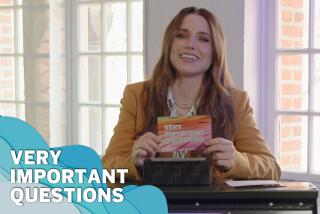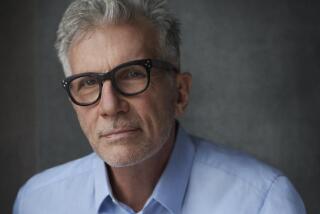Heart of Understanding
I’ve taken a drubbing these past few days. If there are folks you don’t want to cross, it’s high school English teachers. They were dismayed about my column that reached back to a popular work of literature for some thoughts about the U.S. confrontation with Iraq.
Even during my worst high school years, I never received such a string of Fs. But I thank you anyway, dear teachers, even those of you who want my press card suspended until I complete remedial tutoring on Joseph Conrad and his novel “Heart of Darkness.”
By challenging me on one point, you have reaffirmed a more important one.
I’ll generalize this way: America’s public policy debates are too smug, rigid, cocksure, loud, anticipatory and momentary. Think Campaign 2002. Or look at what passes for insight on those television current affairs shows.
Literature reminds us that we are capable of better. And the reaction of English teachers (and other readers) to my use of Conrad in a political context demonstrated that when a columnist shoots in the dark, he sometimes hits upon something.
In my previous meditation on the showdown with Iraq, I pondered the strange way we compartmentalize our lives. Literature is rich with human uncertainty and contradiction; shades of gray, if you will. By contrast, our political discussions are black and white and stridently so. I revisited “Heart of Darkness” because it was a story of danger and moral introspection, a tale of “the impossibility of innocence,” as one critic said. It seemed fitting for the mood of the moment.
English teachers insisted that I had misread Conrad. Since this 100-year-old story of the ivory trade in West Africa was anti-colonialist, they believed I could only conclude that the U.S. had no business interfering with Saddam Hussein today. Since I had argued otherwise, I was awarded the dunce cap.
Nonsense. “Heart of Darkness” should not be used as a literal cue card for policy decisions. If we adhere to that logic, we could find ourselves rolling the clock back on civil rights, because Conrad beheld the world from a racist vantage.
There are far better contemporary books at hand to help us analyze the contemporary Middle East, terrorism, Islam, Western culture and so forth.
So what is the role of literature in a democracy? My encounter with these same English teachers persuaded me that it has a place, and it’s neither gathering dust on the bookshelves nor as an after-hours pleasure apart from our public lives.
Ernest Hemingway wrote about “the underwater part of the iceberg” -- the wisdom and experience that a writer brings to a work but is left unstated or submerged, to support the small portion that is visible. Likewise, readers bring the ballast of their own experiences and sensibilities. The result ends up with a lot of grinding below the waterline, which is why encounters with literature are of the order of experience. It is the original interactive medium.
You don’t have to be stuffy about it, but a challenging book refutes all that is wrong with television and TV-driven public affairs. Just the effort of reading such a book recalibrates our perspectives, just as a stroll through a quiet forest invites reflection in ways that speeding by in a car cannot. At the very least, a preparatory dose of good literature before we speak our minds might restore some depth and add a touch of grace to our civic disagreements.
“Literature exists for the sake of the people -- to refresh the weary, to console the sad, to hearten the dull and downcast, to increase man’s interest in the world, his joy of living and his sympathy in all sorts and conditions of man,” wrote Judge Martin Manton, defending the novel “Ulysses” against its banning in 1934.
Sixty-eight years later, the judge’s words remind us of the very things that go wanting in our public dialogue.
I wish I’d gotten a better grade from the English teachers this time around. But my appreciation for them is nonetheless sincere. Many are regrettably being uprooted and transformed into “communications” instructors or some other faddishness. The remainder, those who teach, defend and argue “Heart of Darkness” and other good books, carry the challenge forward to a new generation.
“Literature,” said Ezra Pound, “is news that stays news.”
More to Read
Sign up for our Book Club newsletter
Get the latest news, events and more from the Los Angeles Times Book Club, and help us get L.A. reading and talking.
You may occasionally receive promotional content from the Los Angeles Times.






